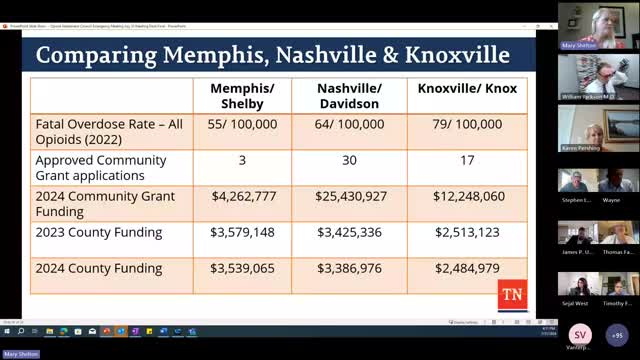Tennessee launches new grants to combat opioid crisis
August 01, 2024 | Mental Health and Substance Abuse Services, Deparments in Office of the Governor, Organizations, Executive, Tennessee
This article was created by AI summarizing key points discussed. AI makes mistakes, so for full details and context, please refer to the video of the full meeting. Please report any errors so we can fix them. Report an error »

In a recent government meeting, officials discussed the ongoing efforts to combat the opioid crisis in Tennessee, focusing on the allocation of community grant funding from the Tennessee Opioid Abatement Trust Fund. The meeting highlighted the importance of utilizing data effectively to inform grant applications and strategies aimed at addressing the state's opioid epidemic.
The council reviewed the fatal overdose rates and the approved community grant applications, emphasizing the need for targeted funding in specific counties identified as having a high demand for opioid abatement projects. These counties include Shelby, Tipton, Anderson, Blount, Campbell, Cumberland, Knox, Roane, and Sevier. The council aims to prioritize applications that focus on primary prevention, harm reduction, treatment, and recovery support.
Mary, a council member, acknowledged the responsiveness of the SAS data team, which provided crucial mapping data within a short timeframe. The council encouraged members to reach out with any data requests to enhance their understanding and approach to the opioid crisis.
The community grants are designed to support projects that deliver services to individuals and communities affected by the opioid epidemic, with a clear directive that 65% of the trust fund must be allocated for statewide, regional, or local abatement efforts. The meeting underscored the collaborative approach needed to tackle this pressing public health issue, inviting input from various stakeholders to refine their strategies and maximize the impact of the funding.
The council reviewed the fatal overdose rates and the approved community grant applications, emphasizing the need for targeted funding in specific counties identified as having a high demand for opioid abatement projects. These counties include Shelby, Tipton, Anderson, Blount, Campbell, Cumberland, Knox, Roane, and Sevier. The council aims to prioritize applications that focus on primary prevention, harm reduction, treatment, and recovery support.
Mary, a council member, acknowledged the responsiveness of the SAS data team, which provided crucial mapping data within a short timeframe. The council encouraged members to reach out with any data requests to enhance their understanding and approach to the opioid crisis.
The community grants are designed to support projects that deliver services to individuals and communities affected by the opioid epidemic, with a clear directive that 65% of the trust fund must be allocated for statewide, regional, or local abatement efforts. The meeting underscored the collaborative approach needed to tackle this pressing public health issue, inviting input from various stakeholders to refine their strategies and maximize the impact of the funding.
Don't Miss a Word: See the Full Meeting!
Go beyond summaries. Unlock every video, transcript, and key insight with a Founder Membership.
✓
Get instant access to full meeting videos
✓
Search and clip any phrase from complete transcripts
✓
Receive AI-powered summaries & custom alerts
✓
Enjoy lifetime, unrestricted access to government data
30-day money-back guarantee

